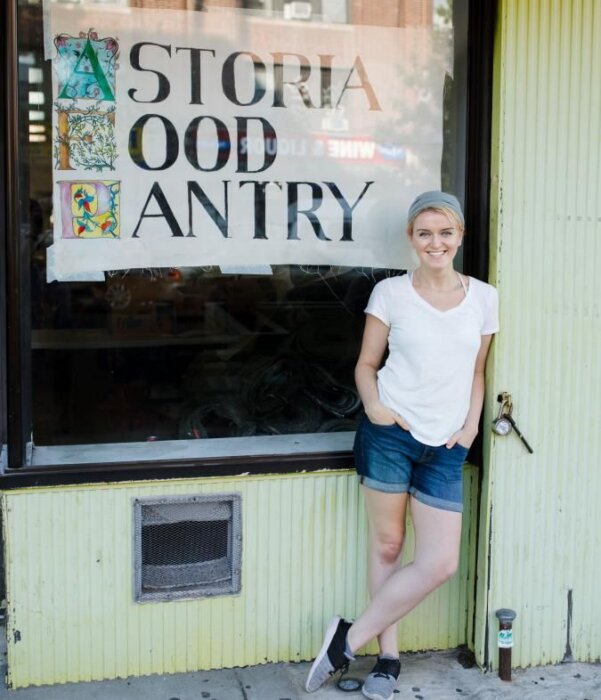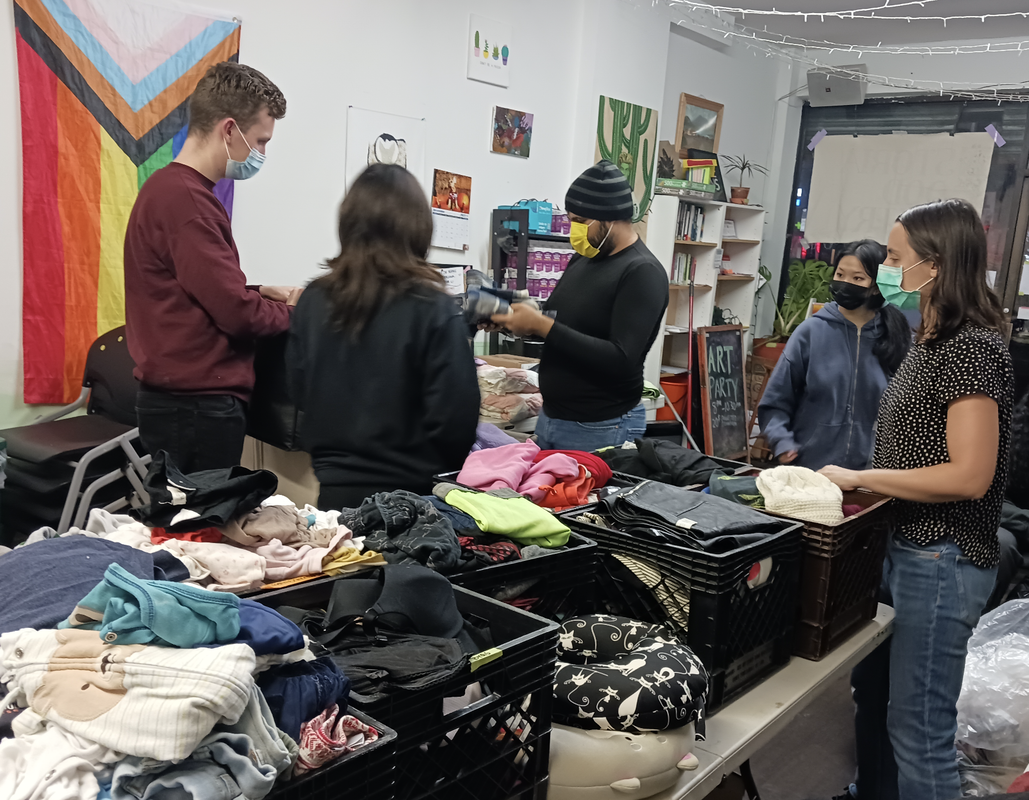Astoria Food Pantry is thriving after the all-volunteer mutual aid organization launched in response to the emergence of the COVID-19 pandemic in 2020.
Macaela Sears, a queer non-binary 34-year-old who started the food project when the pandemic hit New York City, said Astoria Food Pantry is thriving three years later.
“The need has only gotten greater,” Sears said.”We’ve seen more and more neighbors needing food assistance” and the people seeking help are “a lot of folks who have never needed it before.”
A core group of 20 volunteers and an army of community members operating out of a centrally located space in Astoria give out about 450 grocery bags every Monday and provide other services to the community.
The pantry now delivers groceries to public housing at Astoria Houses and Queensbridge Houses and works with select New York City Community Fridges and other mutual aid resources throughout the city.
Many others are pitching in. One volunteer is growing fresh produce for patrons in a hydroponic garden in the pantry’s basement, Sears noted.
The mutual aid organization has also expanded beyond providing just food for those in need. The pantry also opened a free store offering everything from clothing to bedding, gives away diapers once a month, and operates a free rolling library. Community members and volunteers also host their own events, such as a trans creative writing workshop, a sewing class, or English as a Second Language, according to its website and Instagram profile.
The pantry helps everyone from migrants bussed in from Texas to longtime New Yorkers. It shows the power of community coming together to help its neighbors.
“Honestly, it feels miraculous sometimes,” Sears said. The pantry’s donations come from other residents in the neighborhood who chip in $10, $50, and more to sustain the pantry. “The fact that we’ve been able to sustain [this] for three years is bananas.”
What “strikes me as so special about this community,” Sears continued, is that “the community stands up to stick together. When we are in those desperate moments, the neighborhood rallies.”
Neighborly
As a longtime activist, “food justice” was last on their list of things they were “properly educated about,” Sears said.

The Food Justice Movement is a grassroots initiative working to ensure universal access to affordable, culturally appropriate, healthy food for all, according to the Global Council for Science and the Environment.
Sears overheard some mothers in the neighborhood worried about feeding their children when New York City schools were shut down due to the COVID-19 outbreak in March 2020. They jumped into action: They collected about $100 in cash donations from friends, drove to the grocery store, and handed out food from the trunk of their car within days of the city’s shutdown.
“It just felt like a like a slap in the face to think like my own neighbors are not going to have meals for their babies,” Sears said.
They were inspired by the Black Panther Party’s breakfast program, which started in the 1960s. The Black Panther Party launched free breakfast programs before school to make sure children were getting at least one meal a day to help them learn in 1969. The program later was adopted by the federal government, feeding millions of children before school daily.
“I think I’ve always been really interested in in activism,” Sears said. Originally from New Hampshire, Sears moved to the Big Apple in 2007 and wanted to become a solution to the problem and contribute to the neighborhood. The pantry has given them the feeling that “my liberation is tied to the liberation of everybody else,” they said.
Worsening matters
Adding to families’ hardship, Sears recalled when benefits for the Supplemental Nutrition Assistance Program, better known as SNAP, were cut in May 2020, and the neighborhood’s only grocery store, Key Food, closed later that same year. QNS reported the building where Key Food was located was to be replaced by Target and other retailers in a new shopping complex development. Protestors claimed at the time that the unionized store’s closure would turn the neighborhood into a “food desert,” which is a neighborhood without a grocery store, forcing many people — mostly low-income — to travel great distances to get to the closest grocery store.
“They were shutting down the only real grocery store on our side of town in Astoria,” which would make it “really inaccessible,” Sears said, estimating it would be about a 25-minute walk “to get to the next closest grocery store.”
Sears said some Astoria Food Pantry volunteers were involved in the demonstrations against Key Food’s closure. They educated pantry volunteers and patrons about the issue.
The battle against the building’s owner and developers was lost in October 2020, after 50 years in the same location, Astoria Post reported.
“The food pantry has become a little bit of an informational hub for the neighborhood,” they said. “It made a lot of people aware of what was going on and we definitely kept seeing an ever-increasing line of folks at that time because of the Key Food shutdown and because COVID raged on,” as well as inflation and lack of rent relief.
Sears, who is currently a barista and works for a local urban farm when they aren’t pursing their theater and arts projects or volunteering at the pantry, is very much like their neighbors. Many people who live in Astoria are service workers who work in the restaurant industry and are pursuing their artistic endeavors.
“Folks are absolutely just desperately trying to stay housed,” trying to keep up with current rent while paying back rent at the same time, they said, “which leaves no room for food or health care.”
Community matters
Three years later, Sears and other pantry volunteers are also enjoying the interaction with other volunteers, pantry patrons, and neighbors inside and outside Astoria Food Pantry.
“It feels really familiar and warm,” Sears said. “It makes New York City feel like an actual home rather than like a very chaotic rat race.”































